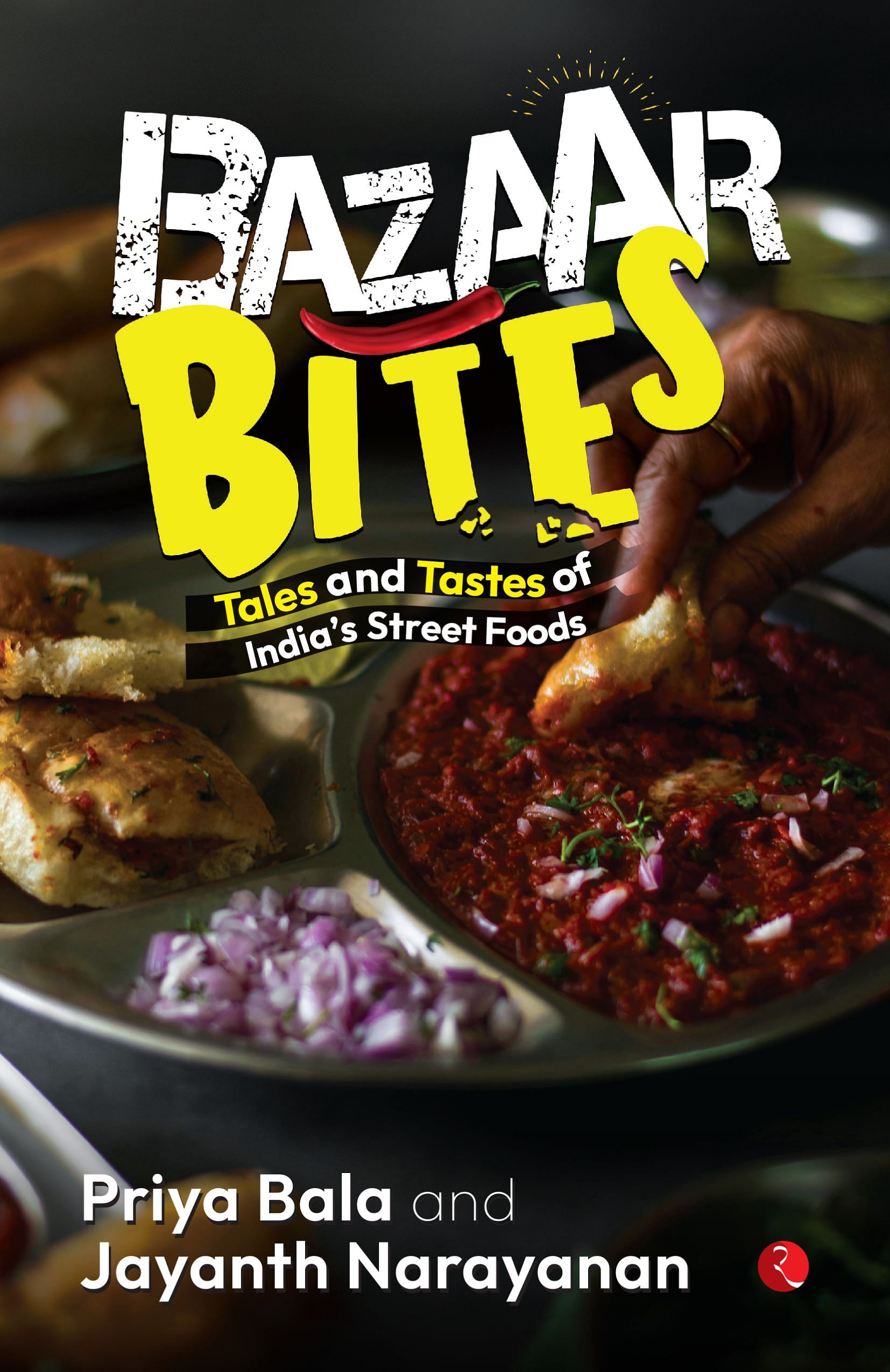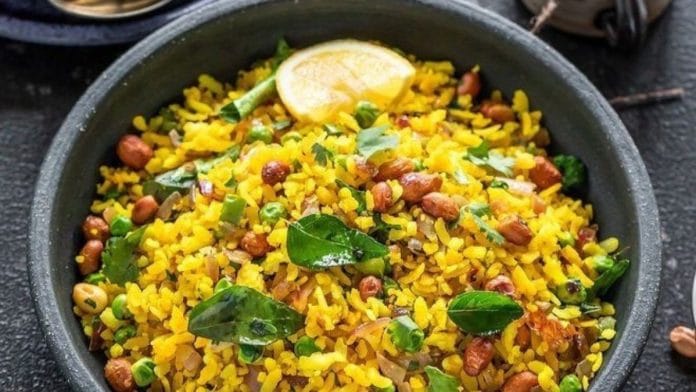Nagpur loves its sweets—Haldiram’s is headquartered here—and is known for the oranges that come from the orchards amidst which the city is located. Sweet makers here turn the oranges into deliciously zesty barfis.
We flew into the city very early and headed for breakfast. At 6.30 a.m., more than a hundred people were milling outside a modest eatery on Wardha Road, not far from the Radisson Blu. It would seem that Nagpur locals don’t bother with cooking breakfast and are happy to head to Ramji Shyamji Pohewale to jostle with the crowds. The tarri poha, Nagpur’s favourite way to kickstart the day, is the speciality here.
Begun by Tribhuvan Nath Pande 30 years ago, it was named after his identical twin sons Ramji and Shyamji. They now run the place, along with two other brothers. The day starts long before dawn for them and the shop opens at 5 a.m. We watched while Ramji stirred up one round of poha. The flattened rice soaking in recycled oil cans is strained and emptied into basins in which you can bathe a baby. Soyabean oil is heated in a massive karhai and in go mustard seeds, peanuts, sliced onions and turmeric. Ramji lifts up the heavy basin with ease and lets the poha drift into the bubbling oil with its condiments. Cubes of boiled potato and the contents of a pack of frozen peas are also added and it takes some heavy-duty stirring before the poha is ready. It’s moved to the counter and served topped with tarri, the dark, super spicy brown-chana gravy that’s the preferred accompaniment. Customers can ask for spicy or medium, and the quantity of tarri will be adjusted accordingly. The plate can be topped off with chivda if you like.
Carrying their plates, several customers head to a table holding a pile of peeled onions. Knives and cutting boards are provided and each one chops up some onion to add to the tarri poha. ‘We put the onions out there, whether they cost `100 or `25 a kilo,’ Ramji said. ‘By letting the customers chop onions for their plate, we save on labour.’ The customers don’t seem to mind one bit and some come here several times a week for breakfast. There are office-goers on their way to work, students, salesmen, senior citizens after their morning walk, all of who have been eating at Ramji Shyamji for many years now. ‘It’s the quality of the ingredients and what we serve that makes them come back again and again,’ Ramji said. ‘We use the best poha, and only soyabean oil for cooking it. Everything is done in sight of the customers. There are no shortcuts or compromises and that encourages them to eat here as they would in their homes.’
A street snack little known outside Nagpur is patodi. A deep-fried pastry stuffed with a mixture of besan, dal and enough fresh coriander to give it a dark-green colour, it’s sold at small stalls and carts across the city.
One stall that’s hugely popular is the one at Civil Lines. The nameless stall is known simply as Zilla Patodiwala since it’s near the administrative office buildings. Now in its 50th year, this business was begun by Omkar Prajapati, who came here from Rajasthan. It’s now managed by his son, Ashok, who mans the one-table stall, from 8 a.m. to 7 p.m. every day. The patodis are prepared in a karkhana (factory) nearby and transported by cycle to the stall. The patodi is broken up and topped off with a ladle or two of kadhi to make one of Nagpur’s favourite street foods. ‘We’ve been here before the new zilla building came up,’ Ashok said, ‘and some customers have been coming every day for years.’ Ashok’s regulars are many and he knows how exactly they like their patodi-kadhi. ‘If the stock is going to be delayed, I have to call and let them know,’ he said as he served us a hearty plate of his speciality.
Pakodas are the generic calorie-laden, hit-the-spot fried snack that all of India loves. Nagpur likes it made with moong dal and fried in marble-sized rounds, and likes it even more when it’s made by Santosh Pakodewale.
A massive flexboard announcing the name with a photo of the owner stands at the front of a three-storey building that’s the backdrop for this business. They needn’t have taken the trouble. For the crowd on the pavement and spilling over onto the road at the stall opposite South Point School on Manewada Ring Road is announcement enough that you’re at the city’s most popular maker of pakodas.
Santosh had no idea the small street-food business he began in 2002 would grow to this size and gain such popularity. Now, he’s a limelight-loving entrepreneur, gold bracelet and massive jeweled rings on his fingers announcing his success. ‘I was working elsewhere and decided it would be good to be my own master,’ he told us, inviting us into his office in the building behind the stall. ‘At the time, I would make pakode from 500 gm of moong dal and sell from the footpath.’
In the next 15 years, his pakode earned a massive following and business flourished. Santosh was able to get his own place in Naren Nagar and establish himself firmly on the food map of Nagpur. More recently, he’s had to move from there to the present address, where he’s acquired a building that serves as store room—he now uses up to 100-plus kilos of moong dal a day—and prep area. This is where the dal is soaked and ground in massive quantities.
At 4 p.m. every evening, three huge karhais are fired up, each manned by two people, shaping the pakode and deep-frying them. They emerge crisp and golden, to be served in paper cones topped off by a green chutney that has blobs of yoghurt in it. ‘Our chutney is our speciality,’ Santosh said. His stall uses up 250 litres of yoghurt for the chutney every day. Besides the pakode, bread pakoda and hot masala doodh—of which they sell 50 litres every evening—are other specialities here. Santosh now employs nearly 20 people, all in uniforms with the Santosh Pakodewala logo embroidered on them. ‘I don’t hire professional cooks,’ said this enterprising street-food vendor. ‘I go looking for people who are lost in life, recovering alcoholics, people on the fringes of society, and I hire them. They find purpose. Food transforms their lives.’ If this stall sees Nagpur locals queuing up every evening, the crowds swell further in the monsoons, for the pakoda is essential rainy-day food. ‘Barish mein toh maja hi maja hai,’ as Santosh put it.
 This excerpt from Bazaar Bites: Tales and Tastes of India’s Street Foods by Priya Bala and Jayanth Narayanan has been published with permission from Rupa Publications.
This excerpt from Bazaar Bites: Tales and Tastes of India’s Street Foods by Priya Bala and Jayanth Narayanan has been published with permission from Rupa Publications.






